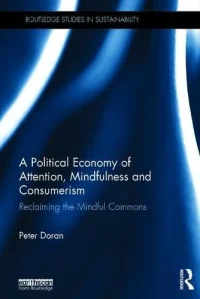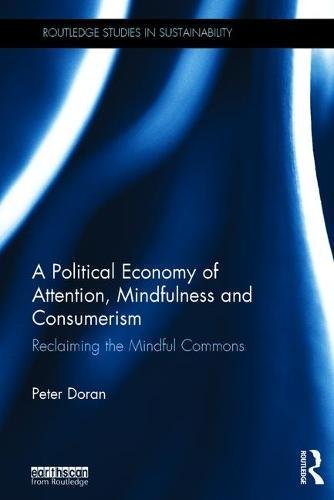Book: A political economy of attention, mindfulness and consumerism: reclaiming the mindful commons
The process by which capitalist investment seeks to re-engineer and privatize nature, government, social life and even genes and physical matter is at once breathtakingly ambitious and subtle and insidious. The great contribution of Peter Doran’s A Political Economy of Attention, Mindfulness and Consumerism is to show how this process is also aimed, with systemic zeal, at human consciousness itself. Whether we realize it or not, our minds and culture are being colonized by markets – through advertising and data-mining, entertainment media and social networking. The hidden political and economic struggle of our times is focused on shaping our inner lives.
This is a large, complicated story based on neoliberal capitalism’s impact on everyday life: frantic work schedules, declining wages, wealth inequality, and austerity politics, all of which have lead to a degradation of public services, social amenities and neighborliness. It turns out that consumerism and market growth, diligently supported by the state, are not in fact “maximizing utility,” as economists would have it. They are breeding personal despair, precarity, alienation and social dysfunction.
The good news is that people are discovering paths of escape from the capitalist phantasmagoria. More: They are creating new zones of self-organized commoning that meet needs and produce things in more socially constructive ways, independent of the state and market.
This trend can be seen in the growing interest in “care of the self” and mindfulness, and in the surge in civic engagement and social mutualism. A robust and expanding digital culture, especially among the younger generation, is discovering the virtues of social collaboration. People are waking up to the huge costs and limitations of the “free market” system – and convivial, life-enhancing dimensions of open-source, commons-based approaches.
A neglected problem, however, is how to build new enabling structures of law and governance to protect such spacious ideals of human life from marketization. One hopeful sign are the dozens of one-off “legal hacks” that attempt to carve out protected zones for commoning, such as Creative Commons licenses to enable legal sharing, multistakeholdler co-operatives for social services, and land trusts to protect the interests of future generations.
Important as these innovations are, what we really need are systemic legal strategies for moving beyond homo economicus. Law and policy need to honor the “nested I,” in which the individual is seen as integrated within larger ecological and social systems. In Doran’s words, the “symbolic architecture of social power” must change so that we can shift from a world based on transactions to one based on relationships. In effect, we must reinvent the political economy of attention.
The mindfulness revolution offers great hope for imagining new ways of being and knowing, as this book so beautifully explains. But it also remains clear-eyed about the dangers of “McMindfulness,” the mainstream effort to neutralize the emancipatory potential of reintegrating mind, body and ecology. In this sense, Peter Doran opens up new vistas of transformation for our consideration — while challenging us to step up to make them real.
David Bollier
Schumacher Center for a New Economics
April 2017

